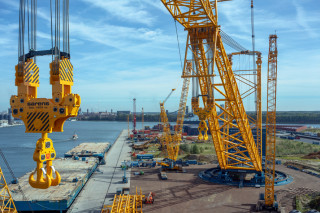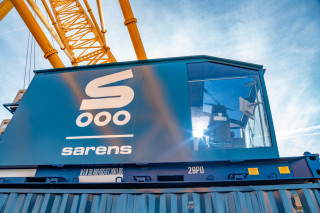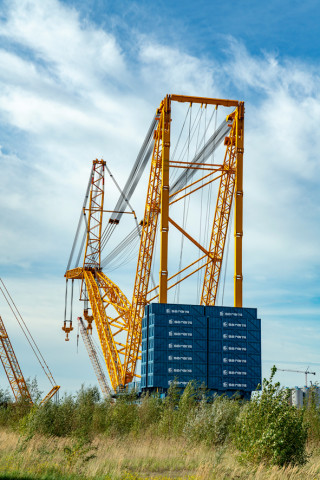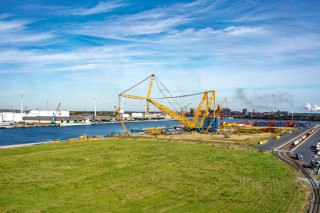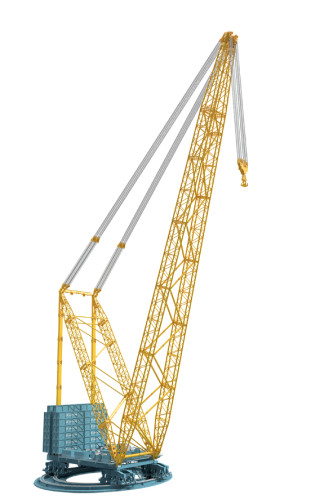Belgian heavy-lifting specialist Sarens has unveiled what it describes as the world’s biggest crane at its construction yard in the Netherlands.
The SGC 250, which has been developed specially for the Hinkley Point C nuclear power project in Somerset, has been undergoing final testing at Sarens’ yard in Ghent and will be delivered to Hinkley Point C later this month.
Here, it will be working for the Bylor joint venture of Bouygues Travaux Publics and Laing O’Rourke Construction on a four-year contract worth £20m.
The SGC (Sarens Giant Crane) 250 has a maximum lifting capacity of 5,000 tonnes and a maximum load moment of 250,000 tonne-metres.
The crane is the fourth generation of the SGC series. With a maximum main boom length of 160m, the crane can be equipped with or without a fly-jib and it can operate on a ring or on straight rails.
At Hinkley Point the SGC 250 will travel along 6km of rail that is being laid in preparation for it. This means that it can travel between three different lift locations without the need for disassembly or reassembly.
The SGC 250 will be mobilised overland from Ghent to a nearby lay-down yard before it is shuttled to the project site. An estimated 280 trucks will be required to deliver the entire SGC, though at the moment the narrow lanes leading to the site only allow 10 trucks per day.
Plans are in the works for a purpose-built access road at the site, says Sarens, but a lot of planning is still needed to finalise the logistics.
At Hinkley Point C the crane will lift components ranging from 50 tonnes to 1,150 tonnes at radii of up to 165m. It will pick up and install prefabricated concrete elements, steel structures and reactor equipment directly from each prefabrication position. A second crane, a 600t-capacity Terex Demag CC 2800, will assist as a rigging crane.
There are many ways of defining the size of a crane; the basis of Sarens’ claim for world’s biggest appears to rely on the machine’s nominal load-moment – the load it can lift at a given outreach. And as CEO Carl Sarens explains, outreach isn’t necessarily the same as radius.
“Radius equals the distance from the centre of rotation to the lifting position; outreach equals the distance from the boom pin to the lifting position. For our clients, it’s the outreach which has most value,” he says.
Crucially, the geometry of the SGC 250 means that the boom hinge pin is located 19m from the centre of rotation. The absolute maximum lifting capacity of the machine can be achieved when it is rigged with 118m of main boom and 5,200 tonnes of counterweight sitting on the 48.5m-diameter slewing rails on the opposite side from the boom pin.
Working at 40m radius, the crane’s outreach is 21m – because the boom pin is situated 19m from the centre of rotation. At this outreach, and in this configuration, the SGC 250 can lift a load of 5,000 tonnes, says Carl Sarens.
“On an outreach of 21m, the SGC-250 is the only crane that can reach 5,000 tonnes capacity with a main boom of 118m,” he concludes.
Other contenders for ‘world’s biggest’ include Mammoet’s PTC 200 DS and ALE’s AL.SK190, used by contractor Keltbray on the Earls Court demolition project in London last year.
Load tables for the PTC 200 DS – rated at 200,000 tonne-metres – show that, when rigged with 117m of main boom a maximum load of 3,200 tonnes can be lifted at a radius of 46m, or an outreach of 26m.
The AL.SK190 boasts a lifting capacity of 4,300 tonnes, a load moment of 196,000 tonne-metres and a maximum boom height of almost 200m – although it was rigged with only 120m of boom at Earls Court.
ALE also has the SK350, which rivals the SGC 250 with a maximum rated lifting capacity of 5,000. This machine has a nominal load moment of 354,000 tonne-metres. ALE says it has designs for doubling up the SK350 to make the SK700, with two winches and booms in parallel lifting 8,000 tonnes with a load moment of 708,000 tonne-metres.

For now though, Carl Sarens is sticking to his claim to be able to offer the most powerful land-based crane in the world – “It all comes down to how the crane is rated,” he declares.
The crane has certainly put Sarens firmly in the limelight, though. “Hinkley Point is an extremely prestigious project, not only in the UK and Europe, but also globally,” says Sarens’ project manager Mark Rowlands. “The eyes of the world will be watching how Sarens performs.”
Once on site, the SGC 250 may need to carry out most of its lifts at night to minimise disruption during the day, when 52 tower cranes will be operating across the site. The giant crane will be fitted with an anti-collision system to ensure no clashes with the site tower cranes.
The construction team is currently working on possible solutions for one rather unexpected problem: the local bat population. If operated at night, the giant crane and its crew will need high-intensity artificial lighting to ensure safe working.
This has the potential to disturb bats – a protected species – roosting nearby.
Vital statistics
Sarens SGC 250
Load moment: 250,000 tonne-metres
Capacity: 5,000 tonnes
Year of construction: 2018
Outer ring diameter: 48.5m
Wheel bogies: 128
Counterweight: 5,200 tonnes
Main boom configuration: 118m/160.5m
Heavy-duty jib configuration: 40.5m-99.5m
This article was first published in the November 2018 issue of The Construction Index magazine
UK readers can have their own copy of the magazine, in real paper, posted through their letterbox each month by taking out an annual subscription for just £50 a year. Click for details.
Got a story? Email news@theconstructionindex.co.uk

